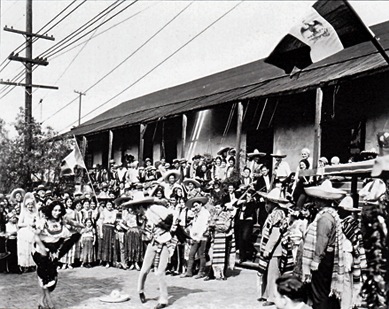By James Street
Editor’s Note: This short story about a chile-eating contest in Tabasco, Mexico, was first published in The Saturday Evening Post on May 14, 1955. The author makes so many errors about chile peppers, black pepper, and melegueta pepper that it’s humorous. How many errors can you spot?

I do not like stories that suggest one thing and mean another and so, right off, I want you to know that the grains of paradise are the seeds of little hot peppers, very hot; and that is a story about some fiery little peppers and some people in the village of Feliz, which is down in Mexico’s state of Tabasco and nine hundred miles from nowhere.
The hotel was on a corner when I was there years ago, and across the way was a church which was surrounded by a gray wall, and the wall was shared by bougainvillea, buzzards and unmeasured time. It was mid-afternoon when I got out of the bus at the hotel. The bus was painted purple and yellow, and bore the name of Rosaura, painted in red. I am sure it was the name of the driver’s sweetheart. In Feliz, everything was personalized.
An Indian was sleeping by the doorway. And his ox team was sleeping. Nothing stirred in the high-mountain solitude of Feliz. The hotel was cool inside, and shadowy, and the clerk opened his eyes when he hears my steps and greeted me sleepily in Spanish. I replied in Spanish, my very best, and that’s pretty bad.
Quickly he was alert and spoke to me in English. His English was no better than my Spanish. He was smaller than I am, considerably smaller, and I am about average. His clothes were messy, but his little black moustache was trim.
I signed the register, and he studied my signature and then he spoke it aloud, “Mr. Cordell Hoyle, Lystra, North Carolina.”
For a second he hesitated, and looked up at me and down at my name, and I had the feeling he was going to ask me a question or make some comment, some pleasantry about the weather or the trip or maybe about American visitors. But he didn’t. he asked me if I’d had lunch, and when I told him I hadn’t, he said that the kitchen was closed, but that he’d arrange for me to have a snack after I’d washed up. Then he hissed, “Psst, psst,” and a barefooted Indian came out of the shadow. The clerk told him to take my bags to Room No. 3.
It was a bowl-and-pitcher room and was on the corner and had two windows. Out of one I could see the plaza of Feliz, empty at that hour, and its trees dropping their somnolence. Out of the other I could see the church — the Church of the Tears of the Blessed Virgin — and beyond the church were the mountains, hovering high in desperate grandeur, heavy green for miles, then hazy blue into the blue sky.
It was these mountains that had brought me to Southern Mexico, almost down to where the country joins Guatemala. In those days I worked for the University of North Carolina’s College of Agriculture and for months I had been in Tabasco and in the adjacent state of Chiapas, looking for a certain variety of corn to be used for experimental purposes. I had come to Feliz to rest a day or two before pulling out for home.
I washed the dust from my face and hands, and changed my shirt and went back to the lobby. The owner of the hotel was there. He was a paunchy man, glistening sweat, and his clothes were as disheveled as the clerk’s, and his moustache was just as trim.




